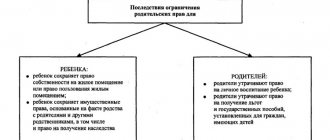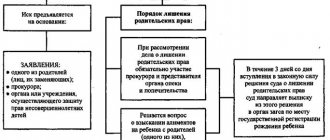Hello! Is it possible to deprive a mother or father of parental rights in relation to a child who has reached the age of majority? If yes, what is the procedure? Thank you.
Deprivation of parenting permission is a frequently used measure of punishment for negligent parents or guardians when they fail to fulfill parental responsibilities in good faith. This procedure is one of the most effective methods of social protection of minor children. Parental rights can be deprived only in court and if sufficient evidence is provided for this. Many people are interested in how this procedure occurs if the child has already reached eighteen years of age? Let's find out whether it is possible to deprive parental rights of an adult child.
Can an adult child deprive his parents of parental rights?
According to Article 54 of the Family Code of the Russian Federation, a person is considered a minor until he reaches eighteen years of age. After reaching this age, a person becomes a full-fledged citizen of the country, that is, civil capacity begins. In some cases, a teenager is recognized as an adult before reaching eighteen years of age - for example, as a result of pregnancy or marriage.
Paragraph 2 of Article 64 of the Family Code of the Russian Federation states that after reaching the age of majority a person becomes a separate unit of society, therefore deprivation of parental rights by such a child is irrelevant, since he is already independently responsible for his actions and has the status of an adult citizen. Upon reaching the age of eighteen, no one is no longer dependent on their parents at the legislative level, so the procedure for depriving adults of parental rights has become unnecessary over time.
Therefore, at the moment, deprivation of parental rights in relation to an adult (eighteen-year-old) child is not carried out in Russia.
But at the same time, for parents of children under 18 years of age, the following legal act is applied in the Russian Federation. This is an extreme measure to protect the interests of children.
Consequences for the child
Deprivation of the parental rights of a mother or father has a strong impact on the child.
Main consequences for the child:
- It is transferred for living to the second parent, guardian or to an orphanage.
- Cannot live in the house where the parent lives.
- When the child reaches 18 years of age, he will retain the right to live in his parent’s apartment (if he lives in public housing).
- Can communicate with the deprived parent only with the consent of the guardian, the other parent or the head of the orphanage.
- Retains the right to alimony. Deprivation of parental rights does not exempt you from paying child support.
- Retains the right to the inheritance of the deprived parent and to the inheritance in the event of the death of his relatives.
- If a child does not have a second parent, then he receives the status of one left without parental care and is transferred under the protection of the state.
Reasons for deprivation of parental rights
The Family Code of the Russian Federation spells out the reasons for depriving parents of the right to education. Let's look at them:
- Failure to fulfill responsibilities towards a descendant. Parents are obliged to create the proper conditions for the growth and development of the baby: feed him quality food, take care of his health and education, etc. If it is impossible to satisfy the natural needs of a minor, the care of his upbringing will be transferred to the state or more reliable guardians;
- Failure to pay child support for more than six months. According to the Criminal Code of Russia, if within six months the party that pays child support does not fulfill its obligations, then the court can forcefully collect the payment or deprive the unscrupulous parent of permission to raise the child. Such situations are considered individually, and depending on the duration of non-payment of child support, as well as additional factors, the father or mother may be deprived of parental rights;
- Refusal to pick up a descendant from a maternity hospital, kindergarten, school or any other educational institution without a valid reason. If, due to compelling circumstances, the parents cannot take the child home (for example, they had an accident and are undergoing treatment), the guardianship authorities are obliged to provide him with a comfortable life. The mother or father must definitely explain the reason why they cannot pick up their baby;
- Abuse of parental rights. This item includes: introduction to alcohol and drugs, inability to create conditions for receiving education, etc.;
- Child abuse (both physical and mental). Here it is worth highlighting the use of force against a minor, insults and exploitation of a child;
- Parents or guardians have alcoholism. At the same time, alcoholism includes not only the consumption of alcoholic beverages, but also the regular use of drugs. According to Article 30 of the Civil Code of the Russian Federation, a citizen is recognized as legally incompetent if he is dependent on alcohol or drugs. This means that, regardless of other factors, he is deprived of permission to raise a descendant;
- Intentional murder (or attempted murder) of one of one's children or spouse or other family member. If the court finds that the crime was committed accidentally, then the parents will be allowed to raise the child. But for the deliberate murder of a family member, this procedure will certainly follow.
USEFUL INFORMATION: Is it possible to abandon your father?
How can you document that your husband is a drug addict?
If you still live with a drug addict, but have definitely decided to deprive him of parental rights, you can use a trick:
1. Persuade him to go to a private treatment center, and then just take a certificate from there. But choose a RC where he will get tested and where there is a narcologist.
2.Also, if your drug addict is a car enthusiast, you can call the police and say that a drug addict is now driving. Tell the police his location, car number and add that this person sells drugs (in this case, the police will be more interested in catching him and they will react more quickly).
3. If you don’t have a car, then just call the police and say that your husband is a drug addict, he poses a threat to the child and you want the police to submit a petition to the court for an examination.
Here, read this article, which describes how and on what basis a drug addict can be forced to undergo an examination and who should help you according to the law: “Forced drug examination: how to do it? Laws of Ukraine, Russia and tips in what order citizens should act"
4.If for some reason the above methods do not suit you, then simply call the police as soon as he comes to visit the child. Don't warn the drug addict about this, let him come into the house. And you call him and say that you want the police to send him for examination now (on the grounds specified in paragraph 3). If a drug addict refuses to go for examination, let the police record the refusal of examination. Attach this piece of paper to the claim.
5. Witness testimony is also suitable at trial. If your mother, father or adult children are aware that there was a drug addiction, then go with them to the trial and let them testify. Also, take neighbors, acquaintances of the drug addict, who is ready to testify, etc.
6. You can call the police and complain that your drug addict husband is threatening to shoot you and your child with a pistol. In that case, he will certainly be detained and checked. Insist that the police take him for examination, according to the article described in paragraph 3. Moreover, he may not have a gun, just say so.
7. Record any threat with statements to the police.
8. Go through the city district departments and ask the police if there were any arrests against such and such. Drug addicts often end up in departments, but relatives are not aware of this. Explain your situation to the police and ask for help, search the database. If there was a conviction, then ask for a conclusion about this for the court.
The more evidence you collect, the easier it will be for you. If the evidence is not direct, then write directly in the claim that you want the court to send this person for an examination, since he is dangerous for the child and you need to prove his involvement in drugs. And in general, even if you have evidence, write such a request in the claim.
As a rule, the court always agrees and satisfies the claim: the drug addict is given a referral for an examination and, if he ignores it, then parental rights are automatically deprived.
Procedure
The process takes place exclusively in court. To begin the procedure, a statement of claim is filed with the court of the district in which the defendant is registered.
It can be submitted by:
- One of the biological parents of a minor, regardless of whether he lives with the child or separately from him;
- Guardian;
- An adult brother or sister. For example, a son or daughter deprives the mother of parental rights if she uses unacceptable methods of education towards his/her minor brother or sister, suffers from alcoholism, etc.;
- City Attorney;
- Guardianship authorities, whose responsibilities include monitoring the conditions in which a minor is raised.
At the same time, the judge monitors the implementation of all legislative norms of the Russian Federation, and the guardianship authorities defend the rights and interests of the child. If they did not file an application to the court on the issue of deprivation of rights, then representatives of this institution are still involved in the consideration of the case.
During the trial, evidence of a violation of duties towards a minor is the stories of relatives, one of the parents (if he does not live in the same territory as the child), and neighbors. Photos and videos can also serve as evidence of parental dishonesty.
Depriving legal parents of rights to a child is an extreme measure to protect the interests of children. After considering the entire situation and reviewing the evidence, the judge may decide to leave the children with their parents if the violation of parental responsibilities was not regular or was due to special circumstances.
What does it take to deprive a father of his legal parental rights?
Once you have collected the evidence base, it is time to file a claim. In the header, indicate the name of the district court, the plaintiff in the case (child), his representative (second parent or guardian), and the defendant. You must indicate your date of birth, place of work, residential address, and contact numbers.
In the middle write the name of the claim (what it is about) and the text itself. In the text, it is necessary to state in dry legal language all the circumstances and facts that are significant for making a decision, and provide supporting documents and other evidence. In the petition part, indicate your requirements with reference to the provisions of the law that govern these issues. Make a list of attached documents. Place the date and signature below.
When the claim is ready, you need to file it in court. This can be done in three ways:
- through the office of the relevant court;
- send by letter with notification;
- give directly to the judge at the reception.
The latter method is preferable, because the judge will look through the package of documents and tell you what evidence is missing; also already at the stage of accepting your claim, the judge can issue you a court request so that you can obtain a number of evidence that, at your simple request or even Authorities are not entitled to provide written requests.
This applies, for example, to characteristics of children from educational institutions or from public clinics. Often, educators, teachers, or even the children’s doctors are not at all opposed to writing you the required reference and without unnecessary requests and red tape, but for the reason that the court accepts only properly executed documents, certificates and references (which means certified by signatures and seals ), then the court most likely will not accept a simple explanation from the class teacher or the child’s attending physician without the required stamp. In order to be able to affix all the necessary seals and signatures of officials to the explanation, as a rule, an official judicial request is required.
After receiving court requests and clarifications from the court regarding inaccuracies in your claim (if any), you can receive a subpoena to appear to prepare the case for trial.
Despite the fact that many people neglect this stage of the process and even consider it insignificant, we strongly recommend that you spend your time and appear to prepare the case for the hearing.
Firstly
, this will allow you to immediately, even before the hearing, provide the judge with additional evidence you have received.
Secondly
, this is another additional opportunity for you to receive the necessary requests to obtain information, for example, about the absence of the defendant in the child’s life, the presence of alcoholism, or the opportunity to request the necessary court order or sentence.
Third
, most likely, already at this stage you will be able to find out the defendant’s reaction, receive his objections, and therefore be fully prepared for the meeting itself.
Fourth
, you will already at this stage establish yourself as a responsible person, strongly interested in the outcome of the process.
After preparing the case, the court hearing itself will be scheduled. As a rule, it is prescribed no earlier than two to three weeks after preparation. This period is given so that all necessary procedural actions are successfully carried out and completed, as well as in order to have time to notify all persons involved in the case during this time.
On the date of the court hearing itself, you need to appear in court at the appointed time, bring with you all available documents and evidence, perhaps some new information that has appeared, be sure to prepare and call with you witnesses whom the court can question in the courtroom on the issue of known them the circumstances and facts of your case.
The meeting itself will be held with the mandatory participation of the guardianship authorities, as well as the prosecutor. These persons are called to court in order to monitor whether the rights of the most important participant in the process - the minor child - are not violated. On this issue, officials can provide their opinion, give explanations to the court, and also ask questions to all persons participating in the case. It doesn't matter whether it's a plaintiff, a defendant or a witness.
What is needed at the trial stage? State your position, ask the defendant questions, answer questions from the court, the prosecutor, the guardianship authorities and the defendant.
When presenting a position, it is important not to go far from the point, but to say everything clearly, understandably and to the point. It is advisable to confirm the factual data immediately and with the norms of the law, do not forget to tell about all the important details, the main thing is that your position looks more justified and significant.
Don't be afraid to ask the defendant direct questions about the child. It is also advisable to prepare a list of questions for the counter-party in advance so that at the most crucial moment, as often happens, everything important and necessary does not fly out of your head.
After the case and all its aspects have been considered, as well as the opinions of persons authorized to protect the rights of the child on the issue of deprivation of rights have been heard, the judge will retire to the deliberation room and, based on the materials of the case, the speeches of the persons, as well as the norms of the law, will make a decision.
What is needed at the trial stage? State your position, ask the defendant questions, answer questions from the court, the prosecutor, the guardianship authorities and the defendant.
After making a decision, if you do not agree with it, you need to challenge it. If you agree, wait until it comes into force. After this, the stage of enforcement proceedings begins.
How to free yourself from addiction?
If, after deprivation of the RP, you want to return your child, contact our Social Support Foundation. We have experienced psychologists who can help you get rid of addiction. We advise drug addicts and look for a clinic where they can receive treatment and quality rehabilitation.
It will take at least six months for a drug addict to get rid of addiction and be able to resist destructive cravings. In some cases, rehabilitation may take longer. But when the drug addict leaves the center, he will be able to clearly say “no” to drugs, undergo a medical examination, and receive all the certificates that will help return the child. Call!









